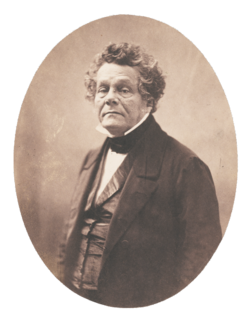Adolphe Crémieux
| Adolphe Crémieux | |
|---|---|

Portrait of Adolphe Crémieux by Nadar, 1856
|
|
| Minister of Justice | |
|
In office 1870–1871 |
|
|
In office February 1848 – June 1848 |
|
| Personal details | |
| Born |
Isaac Moïse 30 April 1796 Nîmes, French First Republic |
| Died | 10 February 1880 (aged 83) Paris, French Third Republic |
| Resting place | Montparnasse Cemetery, Paris |
| Profession | Lawyer, statesman |
| Religion | Jewish |
Adolphe Crémieux (French: [adɔlf kʁemjø]; 30 April 1796 – 10 February 1880) was a French-Jewish lawyer and statesman and staunch defender of the human rights of the Jews of France.
He was born in Nîmes to a wealthy Jewish family, from the papal enclave of Carpentras, which had migrated to Nîmes. He married a member of the Silny family in 1824.
After the revolution of 1830 he came to Paris, formed connections with numerous political personages, even with King Louis Philippe, and became a brilliant defender of Liberal ideas in the law courts and in the press. Examples include his Éloge funèbre of the bishop Grégoire (1830), his Mémoire for the political rehabilitation of Marshal Ney (1833), and his plea for the accused of April 1835. Elected deputy in 1842, he was one of the leaders in the campaign against the Guizot ministry, and his eloquence contributed greatly to the success of his party.
From 1834 until his death, Crémieux served as vice-president of the "Consistoire Central des Israélites de France" (Central Consistory of the Jews of France), the administrative agency for all French Jews. On 24 February 1848 he was chosen by the Republicans as a member of the provisional government, and as minister of justice he secured the decrees abolishing the death penalty for political offenses, and making the office of judge immovable. That same year he was instrumental in declaring an end to slavery in all French Colonies, for which some have called him the French Abraham Lincoln. When the conflict between the Republicans and Socialists broke out, he resigned office but continued to sit in the constituent assembly. At first he supported Louis Napoleon, but when he discovered the prince's imperial ambitions he broke with him.
...
Wikipedia
